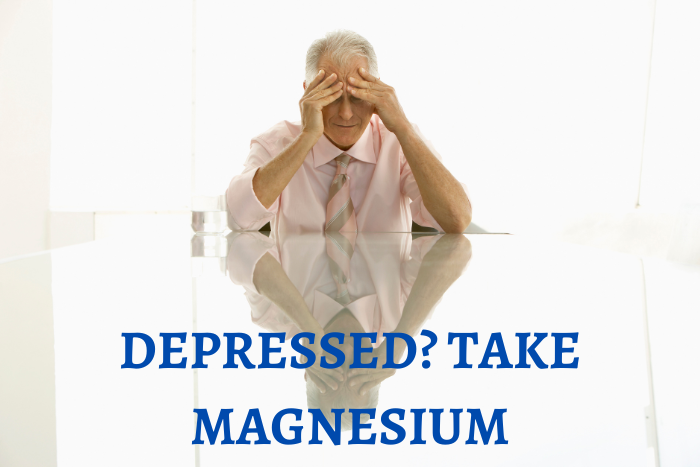
Depression bothers many people in the world. Depressed? Take magnesium. How about drugs? Drugs help people to live meaningful lives. Unfortunately, drugs have side effects. People look for escape through smoking, alcohol overconsumption, and overeating. Magnesium is a simple solution to overcome depression.
What is the body’s metabolism?
The body functions in the right way when it gets all vital nutrients. Vitamins, enzymes, minerals, and amino acids participate in various reactions. The body’s metabolism is an activity when food is converted to energy thanks to the biochemical process. Here, minerals come into the picture. When deficient in one or more minerals, the body can not function well. Various symptoms occur depending on what kind of mineral is lacking in the body. There are some of the conditions which occur when magnesium is deficient:
- Anxiety
- Depression
- Diabetes
- Fatigue
- Hypoglycemia
- Migraine
- Osteoporosis
What is magnesium?
Magnesium is a mineral found in nature. Magnesium participates in biochemical reactions. Magnesium takes part in more than 700 enzyme systems. There are over 68 categories and symptoms where magnesium is deficient.
Depressed? Take magnesium
Serotonin, a neurotransmitter, is a brain chemical. Serotonin makes us feel good when it is released into the brain. Serotonin is found in the gastrointestinal tract, too. Magnesium participates in serotonin production. When magnesium is deficient, we are depressed.
Since World War II, the depression has doubled. Some psychiatric drugs used by people are enormous.
Magnesium participates in serotonin production. When magnesium is deficient, we are depressed.
The Magnesium Miracle
Dr. Carolyn Dean, M.D., N.D. wrote the book The Magnesium Miracle. In this comprehensive book, Dr.Carolyn Dean explains why magnesium is of vital importance. Magnesium participates in the regulation of more than 325 enzymes in the body. Magnesium controls the entry and release of calcium into the cell. Magnesium is involved in brain activity in muscle and nerve functions.

Cell metabolism requires magnesium. DNA, RNA synthesis, cell growth, and reproduction depend on magnesium.
Magnesium for depression
Clinical trials show that magnesium deficiency can trigger anxiety and depression. People can have symptoms such as apathy, confusion, nervousness, dizziness, impaired breathing, rapid pulse, chest pain, palpitations, etc.
According to Carolyn Dean M.D, N.D, the Archives of General Psychiatry, a study pointed out that depression doubled in women from 1970 to 1992. The usage of psychiatric drugs has become high.
Anxiety and depression are often nutrient-deficiency diseases and chemical sensitivities, certainly not drug-deficiency diseases.
Carolyn Dean, M.D., N .D. gives treatment for anxiety and depression in her book The Magnesium Miracle:
Diet
Avoid food additives, artificial sweeteners, sugar, and wheat. Eat a whole-foods diet-organic, if possible and avoid processed and junk food. Also read The Yeast Connection and Women’s Health (Crook and Dean,2005) and IBS for Dummies (Dean and Wheeler, 2005) since both yeast and IBS are associated with anxiety and depression. Understanding and treating these conditions under the supervision of a knowledgeable practitioner can enhance the use of following supplements.
Supplements
Magnesium citrate: 300 mg twice a day
Calcium citrate: 500 mg daily
B complex: 50-100 mg per day ( derived in whole or in part from natural food sources)
5-hydroxytryptamine [5-HTP]: 50-100 mg half an hour before meals, three times a day (this is an amino acid that crosses the blood-brain barrier and is naturally converted into serotonin; it has the same action as Prozac but no side effects)
St.John’s wort: 300 mg standardized extract three times a day
Sleep Aids
Melatonin: 2-3mg one hour before bedtime
5-hydroxytryptamine [5-HTP]:50-200 mg half an hour before bedtime, on an empty stomach
Hops, valerian, and skullcap herbal combinations: one or two 500 mg capsules before bedtime
Stress Release
Exercise is excellent for treating both anxiety and depression ( try yoga, walking, biking, Pilates, T-Tapp, and swimming), as are prayer, meditation, long baths, journal writing, and Emotional Freedom Techniques (EFT).
Conclusion
Magnesium is a vital mineral for us. Without magnesium, our bodies can not perform simple tasks such as breathing, moving, or relaxing. The importance of magnesium is enormous and vital. The complexity of magnesium interactions in the body paints a vivid picture. This mineral is the helper that gives us the quality of life and a fully functioning body. It means that if you are depressed, take magnesium.